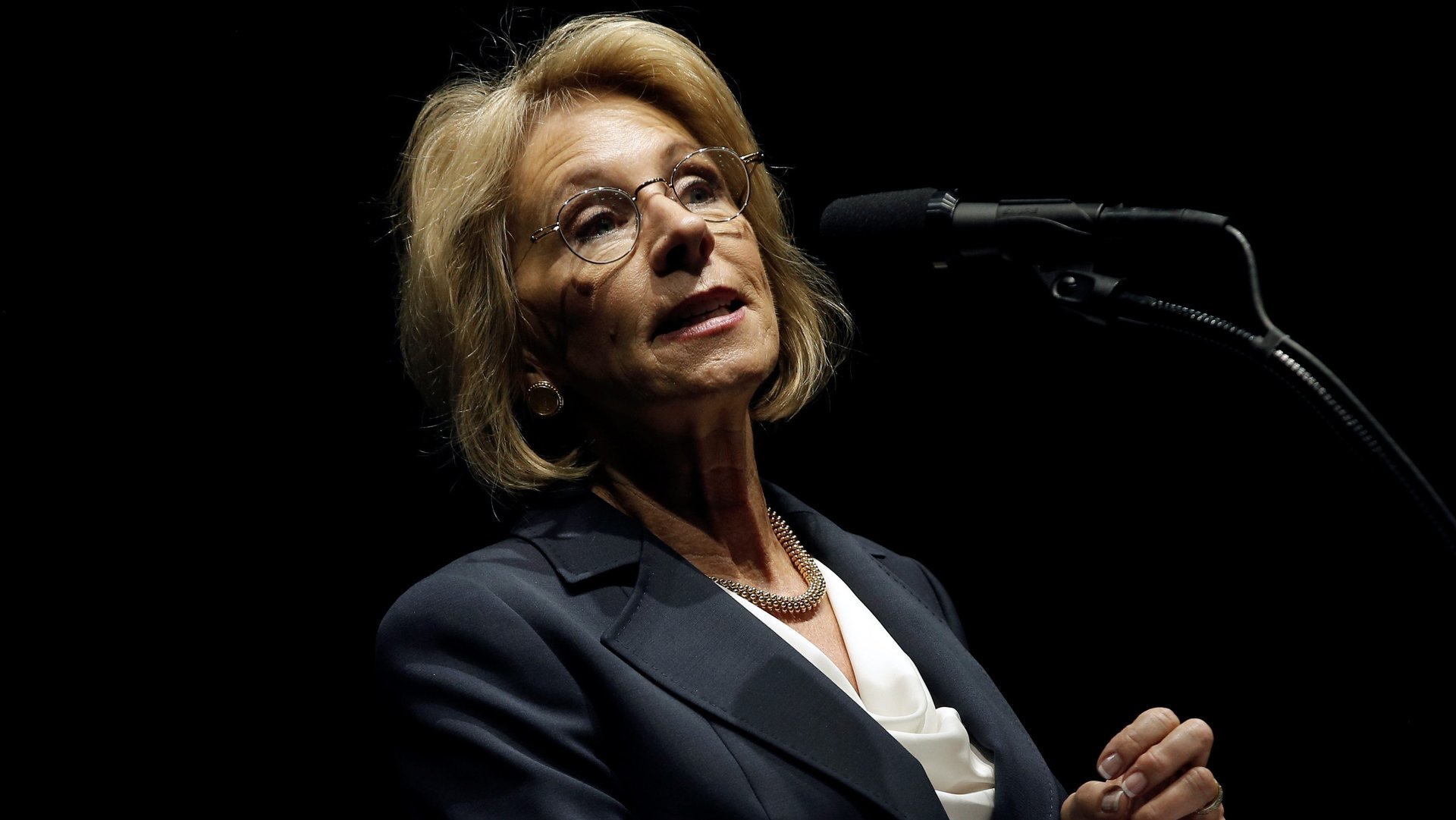What makes Trump’s pick of Betsy DeVos as education secretary so controversial
Betsy DeVos, president-elect Donald J. Trump’s pick for Secretary of Education, will go in front of a Senate committee at 5pm today (Jan. 17), to be grilled about her qualifications for the office. DeVos is already considered a controversial pick for the nomination, and her confirmation could have an outsized impact on the 50 million students that attend public schools in the US.


Betsy DeVos, president-elect Donald J. Trump’s pick for Secretary of Education, will go in front of a Senate committee at 5pm today (Jan. 17), to be grilled about her qualifications for the office. DeVos is already considered a controversial pick for the nomination, and her confirmation could have an outsized impact on the 50 million students that attend public schools in the US.
As the Secretary of Education, DeVos will be in charge of a $70 billion budget, and the federal oversight of the US’s 98,000 public schools that around 90% of American families rely on to educate their children. While most of the funding for public schools comes from state and local budgets, the Secretary of Education funds valuable nationwide programs that do everything from put computers in classrooms to provide additional training for teachers. It also oversees and funds nationwide college grant and loan programs, as well as civil rights protection in schools. DeVos is considered a controversial pick for several reasons.
Neither she nor her children have gone to public school
DeVos herself has no personal experience with government-run education. She attended Michigan’s Holland Christian High School, a private school charging roughly $8,000 a year, and then went on to graduate with a business and political science degree from Calvin College, a private liberal arts college.
None of her children have ever attended public school, either. While DeVos and her husband raised their four kids in an area populated with good public schools—their town, Ada, is the seventh-wealthiest in Michigan—their two daughters were mostly home-schooled, and their two sons attended Grand Rapids Christian High School (tuition $10,000 a year).
A family spokesman notes that some of DeVos’ children-in-law (the people her children have married) have attended public school. Still, DeVos would be the first education secretary in America’s history to have been neither a public school student nor parent.
She pushed an education experiment in Michigan—and it failed
DeVos is a huge believer in “school choice,” the idea of allowing public education funds to follow students to whatever institutions (e.g. charter schools or private schools) their parents want. She and her husband have pushed, through millions of dollars in contributions over two decades, both the school choice movement and the spread of charter schools throughout Michigan.
Charter schools’ popularity is growing in the US, but they remain controversial. Unshackled from government standards and oversight, some schools have excelled at providing better education for students, while others have failed miserably and been forced to close. Critics say they draw funds, and involved parents, away from public schools, leaving them worse off than before.
Federal data show Michigan, where DeVos was instrumental in pushing charter schools, has actually failed to keep up with other states in academics; it ranks near the bottom on national standardized testing. The state’s charter schools also score worse than their public school counterparts, and there are no effective mechanisms for improving failing charters.
She still hasn’t fully disclosed assets, contributions, or conflicts
DeVos is one of the Trump nominees that the Office of Government Ethics was talking about when it warned that Senate hearings were being scheduled before nominees had properly disclosed conflicts and how they intend to resolve them. As of last week, DeVos hadn’t disclosed any possible financial conflicts, only saying in vague language she planned to contact the ethics office in the future.
In administrations past, nominees were normally fully vetted by the OGE before their hearings. DeVos’s hearing was rescheduled from Jan. 11 until today, but her “public financial disclosure report” was still not listed on the OGE’s website as of 2:30pm, meaning it is still incomplete by the ethics office’s standards.
In an earlier disclosure report, which was obtained by the Washington Post and others, DeVos failed to list a $125,000 contribution she made to an anti-union committee.
She and her family (her husband is Amway heir Richard DeVos Jr.) have donated millions to Republican party members—including over $250,000 to the Senators responsible for approving her nomination.
She will be at war with teachers from day one
DeVos and her family have donated tens of millions of dollars to legislation and politicians who seek to weaken the power and influence of unions, yet nearly 1.6 million public school teachers belong to the American Federation of Teachers union.
When DeVos was announced as Trump’s pick, teachers union president Randi Weingarten called her “the most ideological, anti-public education nominee put forward since President Carter created a Cabinet-level Department of Education.” DeVos has no meaningful experience in the classroom or schools, Weingarten said. “In nominating DeVos, Trump makes it loud and clear that his education policy will focus on privatizing, defunding and destroying public education in America.”
DeVos’ hearing is expected to last for several hours, but the Senate has not scheduled additional time for witnesses tomorrow, so it is likely to wrap up this evening.